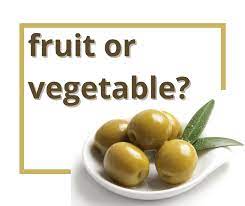Demystifying Olives: Are Olives a Fruit or Something Else?
The question of whether olives qualify as fruits or something else has intrigued culinary enthusiasts and botanists alike for generations. In this article, we embark on a journey to demystify the classification of olives, considering both botanical definitions and culinary perspectives.
Olives: Fruits or Not?
The debate surrounding the true nature of olives centers on their botanical classification and culinary usage. To address this question comprehensively, we must delve into the distinct perspectives that define olives’ identity.

are olives a fruit
The Botanical Perspective
To determine whether olives qualify as fruits from a botanical standpoint, we need to consider the fundamental criteria. Botanically, fruits are defined as the mature ovaries of flowering plants. They typically contain seeds and develop from the fertilized flowers of the plant.
Olives, as it turns out, align perfectly with this botanical definition. They are indeed the fruit of the olive tree, developing from the ovary of its flowers after pollination. Inside the fleshy pulp of an olive, you’ll often find a single seed or pit, further confirming their botanical fruit status.
From an organic and scientific perspective, olives undeniably fall into the category of fruits, sharing this distinction with apples, grapes, and other familiar fruits.
The Culinary View
While the botanical perspective firmly classifies olives as fruits, the culinary world presents a more nuanced view. In the kitchen, olives are celebrated for their rich flavor, versatility, and the indispensable role they play in Mediterranean and international cuisines.
When we speak of olives in a culinary context, we often refer to them as “culinary fruits.” This term acknowledges their fruit origin while highlighting their culinary significance. Olives are brined, cured, or fermented to develop their distinctive taste profiles, making them a staple in dishes ranging from salads to tapenades.
In the culinary arts, olives stand as a testament to the creative use of ingredients, blurring the lines between fruits, vegetables, and condiments. Their role in gastronomy is undeniable, making them an essential component of countless recipes worldwide.
Cultural Significance
Beyond their botanical and culinary attributes, olives hold a profound cultural significance in various regions around the world. These small fruits have been intertwined with traditions, rituals, and history for centuries.
In Mediterranean cultures, olives are revered for their symbolism of peace and abundance. The olive branch, an iconic emblem of peace, has its roots in ancient Greece. Olives and olive oil have played pivotal roles in Mediterranean diets and religious rituals for millennia.
In Middle Eastern cultures, olives are a staple in many traditional dishes, and olive trees are often considered sacred. The olive tree’s longevity, resilience, and ability to thrive in arid climates have led to its symbolism of endurance and hope.
Whether in the form of olive branches at weddings or olive oil in religious ceremonies, these fruits have transcended their botanical identity to become powerful symbols of cultural heritage and values.
Health Benefits
Beyond their cultural and culinary significance, olives offer a range of potential health benefits. Olives and olive oil, derived from the fruit, are integral components of the Mediterranean diet, renowned for their health advantages.
Heart Health:
Olives are rich in monounsaturated fats, which may contribute to heart health by reducing bad cholesterol levels.
Antioxidants:
The antioxidants in olives, such as vitamin E and polyphenols, may help combat oxidative stress and inflammation.
Cancer Prevention:
Some studies suggest that olive compounds may have potential cancer-fighting properties.
Weight Management:
The healthy fats in olives can promote satiety, aiding in weight management.
Digestive Health:
Olives contain dietary fiber, which supports digestive regularity.
Frequently Asked Questions (FAQs) About Olives
Q: What are olives?
Olives are small, oval-shaped fruits harvested from the olive tree (Olea europaea).
Q: Are olives vegetables or fruits?
Olives are classified as fruits, specifically drupes or stone fruits.
Q: How are olives grown?
Olives are typically grown on olive trees, and they require a Mediterranean-like climate for optimal growth.
Q: What colors do olives come in?
Olives can be green, black, purple, or even brown, depending on their ripeness and variety.
Q: Are all olives edible?
Not all olives are edible as some varieties are extremely bitter and require curing processes to become palatable.
Q: What is the difference between green and black olives?
The color difference is primarily due to the level of ripeness; green olives are harvested before they fully ripen, while black olives are riper.
Q: What is the significance of olive oil?
Olive oil is a valuable product derived from olives, known for its culinary uses and potential health benefits.
Q: Can you eat olives straight from the tree?
Eating olives straight from the tree is usually not recommended due to their bitterness. They need to undergo curing or processing to become palatable. 9
Q: What cuisines use olives extensively?
Olives are a staple in Mediterranean cuisines, such as Greek, Italian, and Spanish dishes.
Q: Are olives healthy to consume?
Yes, olives are considered a healthy food choice due to their monounsaturated fats, antioxidants, and potential cardiovascular benefits.
Conclusion
In conclusion, the question of whether olives are fruits or something else is multifaceted. From a botanical perspective, olives unequivocally qualify as fruits, aligning with the fundamental criteria for this classification. However, in the culinary world, they often go by the term “culinary fruits” due to their unique flavor and versatile applications.




